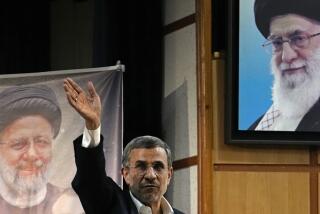Mousavi forms new political front
- Share via
BEIRUT AND TEHRAN — A defiant Mir-Hossein Mousavi declared the creation of a grass-roots political movement Saturday, but the Iranian opposition leader failed to spell out a strategy that could invigorate a protest movement that has stalled.
Mousavi, whose loss in the disputed June election to President Mahmoud Ahmadinejad set off the largest challenge to the country’s rulers since the Islamic Revolution 30 years ago, said he wanted the Green Path of Hope to be a rallying point for the opposition.
“Numerous volunteer and independent social networks throughout the society form the body of this movement,” Mousavi told a group of doctors, according to the semiofficial Iranian Labor News Agency.
“The Green Path of Hope is in fact aimed at regaining people’s denied rights.”
Although the move was an attempt to cement the political movement built on his presidential campaign and the outrage that followed the election, Mousavi’s announcement lacked a political agenda.
One analyst said the Green Path could help Mousavi fend off calls for his arrest by hard-liners close to Ahmadinejad and continue his political activities without getting the ministry approval necessary to create a party.
“Forming a political front gives him a shield to survive and defy the arrest,” said Ahmad Bakhshayesh, a political analyst in Tehran. “If he manages to form a loosely organized front, he can defy the government and recruit like-minded people and . . . put pressure on the government.”
But Mohammad Marandi, a political scientist in Tehran, predicted that the front was doomed to fail because the opposition camp isn’t unified. “Their common enemy is Ahmadinejad, and now they sound united because of their common enemy,” he said. “But culturally, economically and politically, the reformists have clashing opinions.”
The absence of major street protests since Ahmadinejad’s inauguration has dispirited some of the movement’s adherents. Calls by some activists to conduct protests at bazaars and Friday prayers last week went unheeded.
But some close to the opposition say the movement is simply settling into a second stage that could last much longer than the initial zeal whipped up on the streets.
Iran’s “green movement” is expanding from the big cities to the smaller towns and making connections abroad while sharpening goals and ideas, said Mohsen Makhmalbaf, an Iranian filmmaker who serves as a spokesman for the Mousavi camp.
“It’s not that people pour into the street and the system changes,” he said in an interview from Paris, where he is based. “People pour into the streets, then they create a crisis, and then the system changes.”
Hours after Mousavi’s announcement, the Revolutionary Court, controlled by hard-liners close to Ahmadinejad, announced a third session today of a mass trial against defendants accused of fomenting the unrest that followed the election, state news reports said.
International human rights monitors, foreign leaders and domestic critics have derided the televised proceedings as little more than Stalinist “show trials” that fail to measure up to Iranian legal standards and damage the reputation of Iran’s political and legal system.
The court also announced that seven alleged leaders of the country’s Bahai community will stand trial on charges of spying for Israel, desecrating Islam and spreading propaganda against the system, according to the official Islamic Republic News Agency. Shiite Muslim clerics consider the Bahai religion, born in 19th century Persia, heretical.
Despite concerns about Iran’s justice system, there are few signs that the supreme leader, Ayatollah Ali Khamenei, has any plans to adjust the country’s course.
He officially named hard-liner Sadegh Larijani, a member of the powerful and conservative Guardian Council and the brother of the speaker of parliament, to a five-year term as head of the judiciary. Last week, the council elected hard-liner Ayatollah Ahmad Jannati, a staunch supporter of Ahmadinejad, as its chairman for the next year.
--
Mostaghim is a special correspondent.
More to Read
Sign up for Essential California
The most important California stories and recommendations in your inbox every morning.
You may occasionally receive promotional content from the Los Angeles Times.










